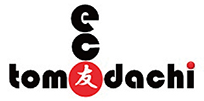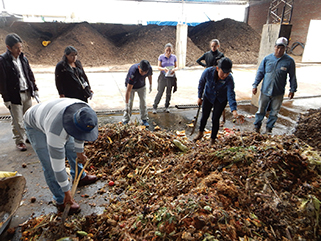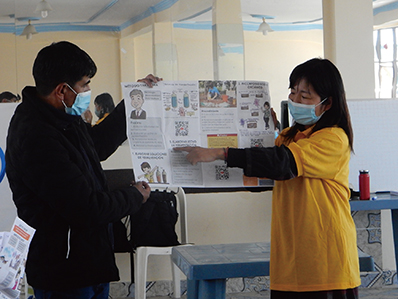Stories from the Field 5
Making Use of Japanese Techniques and Expertise to Improve the Environment in Bolivia!
—The success of ECO-TOMODACHI created by ex-JICA trainees—

ECO-TOMODACHI’s logo (Photo: JICA)

Sharing composting techniques among ECO-TOMODACHI members specialized in waste disposal (Photo: JICA)

Mr. Encinas and a compost consultant (ex-Japan Overseas Cooperation Volunteer) carrying out training on composting for residents involved in the tourism industry in Uyuni City (Photo: JICA)
In Bolivia, tourism areas such as the Uyuni Salt Flats located at an altitude of over 3,000 meters above sea level are littered with trash brought in by tourists and lack available toilets. Improving the environment and sanitary conditions in these areas has become an urgent issue. The JICA Bolivia Office cooperates to improve these environments with the aim of revitalizing tourism, which has slumped in the wake of the global spread of COVID-19. In specific terms, JICA works with the Departmental Autonomous Government of La Paz to support the conservation of tourism resources as well as the establishment of a foundation for sustainable development, including training in sanitary management for tourism operators.
As part of this support, six Bolivians who had received JICA training in Japan formed a group called “ECO-TOMODACHI (Tomodachi means friend in Japanese)” in 2017. ECO-TOMODACHI carries out a variety of activities such as waste management, improvement of sanitary environments, and promotion of environmental education across Bolivia in cooperation with local public entities, private companies, NPOs and others. It promotes sustainable tourism development as well.
Having studied waste management and the composting*1 of organic waste in JICA’s Knowledge Co-Creation Program (KCCP), they are applying the techniques and expertise acquired in Japan to Bolivia and working on their practical implementation and dissemination in a way suitable for the local environment, with JICA’s support for their activities. ECO-TOMODACHI is not limited to JICA returnees, therefore the network has expanded considerably and Japanese technology for waste management and improvement of sanitary conditions has been utilized throughout Bolivia.
Mr. Edwin Encinas, a founding member of ECO-TOMODACHI who proactively promotes activities to spread waste management and composting, said as follows: “Legislation on waste management in Bolivia’s local public entities was enacted only in 2015, and initially there was a lack of awareness in the country, and we had difficulties in gaining the cooperation of residents. Nevertheless, with the support of JICA, and through steady progress, more local public entities and residents are getting involved in waste management and reduction.” He continued, “Japanese techniques for waste management and composting require some time and effort, however the approach itself is simple and is characterized by a high level of adaptability to natural environments. It is very pleasing and enjoyable to let people know that they can turn waste into resources through cyclical composting and use it to grow vegetables.”
Ms. WATANABE Mariko, a JICA Bolivia Office staff, also said about their future activities, “While rolling out promotion, technical cooperation, and tourism strategy proposals for environmental improvements, we try to establish an appropriate support framework through exchanges of views with local residents. As one of our environmental education initiatives, we have also worked with Japanese and Nikkei companies, local public entities, and ECO-TOMODACHI to develop a mobile phone app to learn composting methods. We hope to continue cooperation schemes with Japanese and Nikkei companies while listening to the voices of people in various locations.”
Furthermore, the Bolivian Mountain Guides Association and the Socorro Andino Boliviano rescue team work in cooperation with ECO-TOMODACHI and JICA to improve waste disposal and toilet conditions on tourist routes, in response to the increased numbers of mountain-climbers from within and outside Bolivia. Through environmental education to mountaineering guides and residents at the foot of mountains, the Association and the rescue team aim to recycle human waste by composting it to use it for agricultural purposes. There is also a high awareness among the residents of the highland areas that are becoming tourist destinations. “People are proactively cooperating with activities, towards post-COVID-19 tourism development,” said Daniel Zaconeta, director of Academia Aventura, a tourism school, expressing his hopes for the program. As a member of ECO-TOMODACHI, Mr. Zaconeta works with JICA to improve the environment in tourism areas.
Mr. Patrick Prieto, Chair of the Bolivian JICA alumni association and also of the JICA alumni association in Latin America and the Caribbean, said about the future outlook as follows: “The number of the JICA returnees in Bolivia is around 6,000. They are sharing their knowledge and experiences acquired in Japan with people around the country. Following the efforts to improve waste management and sanitary conditions together with local public entities, we will utilize our experience in realizing environmental improvements in the tourist destinations as well. We also hope to share our experiences of ECO-TOMODACHI in Bolivia with other parts of Latin America and the Caribbean, which has around 70,000 JICA returnees, and carry out activities similar to ECO-TOMODACHI in other countries.” The continued success of ECO-TOMODACHI, which aims to utilize Japanese technologies to create a recycling-based society together with JICA is highly expected.
*1 Composting means to produce useful compost by using the effects of microorganisms to ferment and break down organic matter such as food waste, fallen leaves, and sewage sludge.
<< Previous Page Next Page >>
Main Text | Reference Statistics | Stories from the Field | Master Techniques from Japan to the World | ODA Topics
